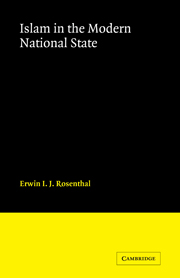Book contents
- Frontmatter
- Contents
- Introduction
- Acknowledgements
- Abbreviations
- Note on transliteration
- PART I CONTEMPORARY ISLAM IN CRISIS AND TRANSITION
- PART II ISLAM IN THE MODERN NATIONAL STATE
- SECTION I CONSTITUTIONAL ISSUES
- SECTION 2 CHANGES IN LAW AND THE EMANCIPATION OF WOMEN
- SECTION 3 THE PLACE OF ISLAM IN NATIONAL EDUCATION
- 14 Islam and Education in Pakistan
- 15 Islam and National Arabic Education in Tunisia and Morocco
- Epilogue
- Notes
- Select Bibliography
- Index
14 - Islam and Education in Pakistan
Published online by Cambridge University Press: 05 September 2013
- Frontmatter
- Contents
- Introduction
- Acknowledgements
- Abbreviations
- Note on transliteration
- PART I CONTEMPORARY ISLAM IN CRISIS AND TRANSITION
- PART II ISLAM IN THE MODERN NATIONAL STATE
- SECTION I CONSTITUTIONAL ISSUES
- SECTION 2 CHANGES IN LAW AND THE EMANCIPATION OF WOMEN
- SECTION 3 THE PLACE OF ISLAM IN NATIONAL EDUCATION
- 14 Islam and Education in Pakistan
- 15 Islam and National Arabic Education in Tunisia and Morocco
- Epilogue
- Notes
- Select Bibliography
- Index
Summary
The role of Islam in education varies from country to country and depends on the place of Islam in the life of state and society in each of them. We are not so much concerned with the private sector of education and religious instruction of Muslim children, but primarily with public or national education. Here, too, we mus distinguish between facilities such as Turkey offers to the children of parents who want religious education for them on the one hand, and compulsory education such as is laid down in Pakistan for all Muslims. The dividing line between instruction in Islam as a religious faith and in Islam as the patrimony of the nation and a decisive or at least important element of its culture and civilisation is often not sharply drawn. This is due to the attitude towards Islam which is itself not always unequivocal, as we have repeatedly seen. We must therefore expect to see a certain ambiguity reflected in the educational field as in other aspects of national thought and life. Besides, we must not forget that every government is forced by circumstances to emphasise the utilitarian aspect of education which inexorably first demands to combat illiteracy, and to provide for vocational and technical training without which the national economy cannot be sound.
We should therefore be prepared for difficulties, some of which at least we encounter ourselves in our highly developed, often affluent societies in the West.
- Type
- Chapter
- Information
- Islam in the Modern National State , pp. 344 - 361Publisher: Cambridge University PressPrint publication year: 1965



